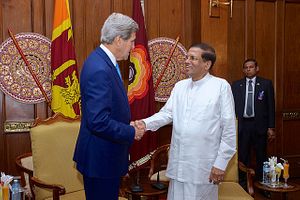The unexpected election of Maithripala Sirisena in Sri Lanka’s January 2015 polls has resulted in the Barack Obama administration’s fervent desire to turn the page on what became a strained, bitter bilateral relationship under the reign of the previous president. Mahinda Rajapaksa had been in power for nearly a decade and oversaw the decisive military defeat of the separatist Tamil Tigers – ending a civil war which lasted from 1983-2009. Rajapaksa’s proclivity for corruption, nepotism, and heightened authoritarianism ultimately led to his unexpected ouster.
Mangala Samaraweera, Sri Lanka’s foreign minister, is currently in Washington, D.C. This high-level visit is due to evolving U.S.-Sri Lanka ties and the commencement of the first ever U.S.-Sri Lanka Partnership Dialogue. An array of issues such as economic and security cooperation, governance, and regional affairs will be discussed on February 26. It remains to be seen whether transitional justice will receive significant attention, either publicly or privately.
Transitional justice, especially holding perpetrators accountable for alleged wartime abuses, is without question the most controversial, politically difficult, and significant component of Sri Lanka’s reform agenda. Accordingly, the United States and its allies should pressure Colombo about this aspect of reforms specifically, in order to promote lasting peace in what remains a divided, post-war country.
Unfortunately, the bulk of the new government’s reform agenda remains incomplete and there are no guarantees that Colombo will be able to follow through on all of the promises it has made, including creating a new, more inclusive constitution, implementing a comprehensive transitional justice package, and meaningfully dealing with high-level corruption.
Irrespective of who holds power in Colombo, the Sri Lankan government cares about its international image and international pressure makes a difference. Even the cosmetic moves Rajapaksa made while he was in power — creating the Lessons Learnt and Reconciliation Commission (LLRC); releasing the LLRC’s final report in its entirely; and holding Northern Provincial Council elections — were a direct result of sustained international pressure. Absent international pressure, the Sinhala-dominated central government remains unlikely to reach out to Tamils in a substantive fashion.
The recently passed UN Human Rights Council resolution on Sri Lanka is far from perfect, although it contains many good points and useful recommendations, especially when it comes to transitional justice. The United States played a leading role in the resolution’s passage and the Sri Lankan government even co-sponsored it. In that context, this week’s dialogue presents the U.S. with a unique opportunity to reiterate the importance of implementing a comprehensive transitional justice package, which would include a robust judicial mechanism to handle alleged wartime abuses, a strong truth and reconciliation commission, and a lasting political solution to address the longstanding grievances of the Tamil community. Colombo must believe that these are all front burner issues for the United States and that a deepening of ties – particularly on the political, military and strategic fronts – won’t be possible until more tangible progress is made.
America remains well-positioned to help a divided nation begin healing the wounds of war, but that won’t happen with fluffy speeches, high-level visits and effusive praise. The U.S. should not be too eager to reengage or reset relations with Sri Lanka at this time, just because there have been some modest and asymmetrical democratic gains.
To conclude, it’s imperative that the international community, especially the United States, keep the pressure on Sri Lanka to help consolidate the nation’s recent democratic gains and assist a war-torn country build a durable peace. By speaking with a clear voice on the toughest of subjects during the U.S.-Sri Lanka Partnership Dialogue, Washington would be sending a strong message to the political leadership in Colombo. The United States would also be communicating directly with the Sri Lankan people: Even though Sri Lanka’s path toward transitional justice and a lasting peace is a process that’s owned and managed by Sri Lankans, it’s a journey that the U.S. will remain deeply committed to – by leading from the front.

































